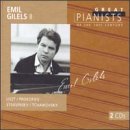| All Artists: Emil Gilels, Stravinsky, Medtner, Prokofiev Title: Great Pianists 35 Members Wishing: 2 Total Copies: 0 Label: Polygram Records Release Date: 3/9/1999 Genre: Classical Styles: Opera & Classical Vocal, Chamber Music, Forms & Genres, Concertos, Sonatas, Suites, Historical Periods, Classical (c.1770-1830), Modern, 20th, & 21st Century Number of Discs: 2 SwapaCD Credits: 2 UPC: 028945679624 |
Search - Emil Gilels, Stravinsky, Medtner :: Great Pianists 35
 | Emil Gilels, Stravinsky, Medtner Great Pianists 35 Genre: Classical
|
Larger Image |
CD Details |
CD ReviewsA Titan of the keyboard C. Pinheiro Jr. | São Paulo, Brazil | 02/02/2006 (5 out of 5 stars) "Emil Grigoryevich Gilels (1916-1985) was the epitome of the Russian-school virtuoso, an artist who combined exceptional technical prowess, a distinctive singing line and a deep insight into the styles of the composers whose works he performed. He was every bit as great as his contemporary and compatriot Sviatoslav Richter (1915-1997), though their respective approaches to music were strikingly different. He had all of Richter's colour, fire and extraordinary technique - his octaves alone rank with those of Josef Lhevinne, Vladimir Horowitz and Mischa Levitzki as the sharpest and most exciting in pianistic history - and his architectural grasp of a piece was unique.
This second set of Philips's Great Pianists series is the most interesting of the three (the maximum alloted) dedicated to Gilels, because it more accurately represents the defining characteristics of his art. In Liszt's rarely played Figaro fantasy, one can savour the swashbuckling bravura and fire-eating virtuosity of the young Gilels in what is probably the finest performance of this piece ever recorded (aside from the poor monaural sound). From the same composer, two other gems are included: a Spanish Rhapsody which is technically as brilliant as Simon Barere's famous 30's rendition and musically more convincing; and a Hungarian Rhapsody n. 9 which is quite the equal of Lazar Berman's legendary 1961 version. Technique to burn is also displayed in Stravinky's Three Movements from Petrouchka, along with the pianist's customary firm understanding of the work's frame and a remarkable sense of spontaneity, all the more in that it's a live performance. Again, this is a Petrouchka to rank with the best available, notably Maurizio Pollini's classic recording. But Gilels was much more than scorching virtuosity, and his lyricism and poetry can be heard in the slow movement of Prokofiev's Sonata n. 8, op. 84 and in Medtner's Sonata Reminiscenza. There is more outstanding Prokofiev in the Sonata n. 3, op. 28 - in Gilels' hands, allegro tempestoso indeed -, in the Visions Fugitives and in the march from the Love for Three Oranges, all played with a mixture of abandon and control seldom encountered anywhere. On the piano and orchestra front, we also have here a potent, solid and beautifully honed interpretation of Tchaikovsky's concerto n. 2, op. 44 (with the Siloti-condensed second movement), which highlights Gilels' technical refinement and gorgeous tone. Emil Gilels belongs in the company of the giants of 20th century pianism, and this set reveals him in great form. His massive command of the keyboard, his glorious sound and his keen interpretative mind are all present. Sets 1 and 3, however, have the advantage of concentrating on the Russian master's staple diet of his mature years - notably Mozart, Beethoven and Brahms - and are also mandatory listening for piano enthusiasts." |

 Track Listings (17) - Disc #1
Track Listings (17) - Disc #1